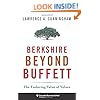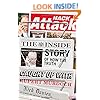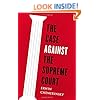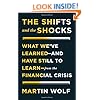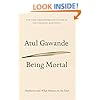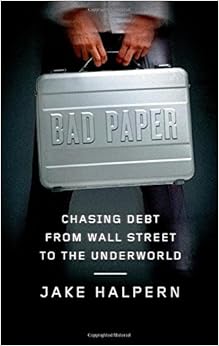



Bad Paper: Chasing Debt from Wall Street to the Underworld Hardcover – October 14, 2014
| Amazon Price | New from | Used from |
|
Audio CD, Audiobook, MP3 Audio, Unabridged
"Please retry"
|
$21.77 | — |

Don't have a Kindle? Get your Kindle here, or download a FREE Kindle Reading App.
Step right into Neil Patrick Harris's shoes in an exciting, interactive autobiography that places the reader squarely in the driver's seat. Learn more
Product Details
Would you like to update product info or give feedback on images?.
|
Editorial Reviews
Amazon.com Review
An Amazon Best Book of the Month, October 2014: Everyone knows about collections agencies, but how they actually operate is much more interesting than you probably think. Falling somewhere between Glengarry Glen Ross and Mean Streets, Jake Halpern's Bad Paper introduces us to an economy spanning many shades of gray. Halpern's book tracks the descent of "paper" (spreadsheets containing the information of millions of debtors and their debts) as it's sold for pennies on the dollar by banks and credit companies and passed through a network of collectors. Files are often bought and sold multiple times, each transaction stripping away the best remaining prospects as collectors wring paper dry through all manners of persuasion and coercion. Along the way, Halpern encounters first-hand the game's players, from the financiers at the top of the pyramid to mid-level "brokers" and the ground-level phone-jockeys; these are all hard men within their contexts, as one tale of a Tarantino-grade stand-off over stolen information attests. This book is unexpected, and unexpectedly fun. --Jon Foro
Review
“A dramatic rise-and-fall tale . . . Halpern brings unexpected literary heft to the world of debt collection.”
—Kirkus
“By fostering a greater understanding of the workings of debt collection, [Bad Paper] sheds enough light into the shadows to compel readers to push for change.”
—Publishers Weekly
“Bad Paper is nonfiction that reads like the finest thriller: suspenseful and frightening, eye-opening, and even, at times, funny. Jake Halpern’s fascinating, fearless tour of the underworld of debt collections introduces us to a cast of characters—the (mostly) men behind the scary phone calls—who deserve to be the stars of the next great HBO drama.”
—Joseph Finder, bestselling author of Suspicion and Paranoia
“Bad Paper is a riveting tale, fast-paced and filled with unforgettable characters. It is also a deeply reported and powerful exploration of America’s shadow economy.”
—David Grann, author of The Lost City of Z and staff writer for The New Yorker
“Jake Halpern knows how to follow the money. Only a consummate reporter could have achieved such an intimateview of the two debt collectors he chronicles here. And because he really knows how to tell a story, we can’t take our eyes off this nasty business.”
—Anne Fadiman, National Book Critics Circle Award–winning author of The Spirit Catches You and You Fall Down
“Bad Paper is a terrific achievement—for the wonderful Ponzi-scheme absurdity of the story, for the outsized characters and the skeptical sympathy they elicit. It’s a book that hangs out in that gray and widening zone where the civilization we take for granted starts to break down, and it reads like Michael Lewis with a sense of the abyss. It’s about downward mobility and the subtle apocalypse and it feels important—important in the way few books ever are.”
—Gideon Lewis-Kraus, author of A Sense of Direction
“Jake Halpern’s gripping tale provides an unprecedented view into the criminal underbelly of consumer finance. It’s required reading not only for everybody with creditors on the line, but for anybody who cares about money or debt.”
—Felix Salmon, senior editor, Fusion
Praise for Braving Home
“The old homily ‘there is no place like home’ has never been more poignantly and wittily revealed than by Jake Halpern in these lovely vignettes.” —Studs Terkel
“Strangely fascinating and endearing . . . In short, it’s terrific.” —Bill Bryson
“Not for a long time have I read a book so good and so wise.” —Robert Stone
More About the Author
Eventually, I got swept up in the bohemian spirit of it all and set to work on piece of writing of my own, a screenplay to be precise. The screenplay, which was called the Papaya Trap, was about a con artist who falls in love with a beautiful one-armed girl.
The truly transformative event of my time in Prague, however, was my decision to investigate my family's roots in this part of the world. I knew that some of my ancestors had once lived in Prague, and on a whim I telephoned my great-uncle (Joe Garray) in America, and asked him if we had any relatives who were still here. "No they all perished in the holocaust," he said. But I kept pushing him and eventually he told me that the man who saved him from the Germans still lived in a farm house in Slovakia at the edge of the Tatra Mountains. A week later I took a commuter plane to Bratislava and then a train to the small town where this man lived.
I showed up at his door after sundown and he came to the gate cautiously, leaning heavily on a wooden cane, face trembling and bald except for a few long loops of white hairs, his feet engulfed in a swarm of mutts who guarded his every step. After trying to explain who I was for almost five minutes, he led me through the back door and into his kitchen. It was bare room, illuminated in dingy fluorescent light, occupied only by a few stools, a couch covered in dog hairs, and a hissing radiator. Here he told me about hiding my uncle and their numerous close calls with the Slovak Gestapo. When the situation at the farmhouse became too heated, they fled to the mountains in the cold of winter and lived like hermits for six months. More than anything else this story convinced me that I wanted to dedicate my life to becoming a professional storyteller.
After college, I landed an internship at The New Republic. My chief responsibility at the magazine was researching and fact-checking. I spent hours, days, and weeks looking for correct spellings and exact dates. Being a quick fact-checker was always a point of pride among the office grunts like myself, and though it was an obscure and largely useless skill, I found it quite helpful in tracking down information on dangerous and outlandish towns. On my lunch breaks and in between assignments I searched for clues, and gradually I found them ' reports of holdouts living on lava fields, windswept sandbars, and desolate arctic glaciers. I spent Sunday afternoons combing the web with a smattering of search terms like 'squatter,' 'won't leave home,' and 'people call him crazy.' I became friendly with the press office at the Federal Emergency Management Agency (FEMA), and I pumped them for ideas. It turned into something of a hobby.
Eventually, the short magazine pieces that I wrote on people and their homes attracted the interest of a literary agent who convinced me to write a book, which I then did. This book ' Braving Home (Houghton Mifflin, 2003) ' allowed me to quit my job and become a fulltime, self-employed writer.
Customer Reviews
| 5 star |
|
|
| 4 star |
|
|
| 3 star |
|
|
| 2 star |
|
|
| 1 star |
|


